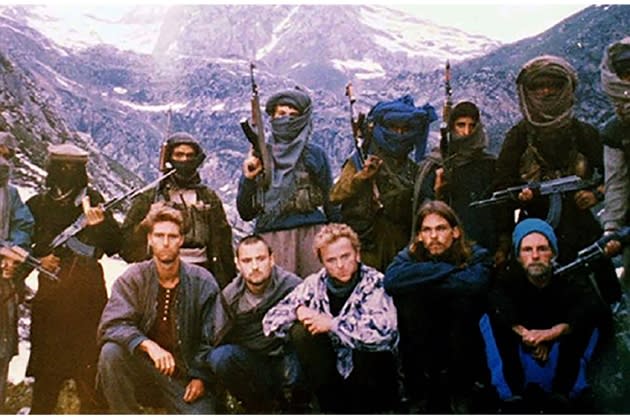Kidnapping of Actor Hans Christian Ostrø Revisited by Sister in ‘The Golden Swan’

In July 1995, six western tourists and their guides were kidnapped in Kashmir, India, by the terrorist group Al Faran. The episode is believed by many to have marked the beginning of modern terrorism. Amongst those captured was 27-year-old Norwegian actor Hans Christian Ostrø, whose brutal murder sent shock waves throughout the world. A poet, Hans Christian wrote constantly on every surface he could find while in captivity. Most of what he wrote was passed onto his family after his death, and has never been released to the public.
Almost three decades after the kidnapping, Hans Christian’s younger sister, the film director Anette Ostrø, is finally ready to tell her brother’s story with the help of his own words. In “The Golden Swan,” one of 21 projects to be presented as part of this year’s IDFA Forum Pitch program, Anette looks back at the kidnapping to pay homage to her brother’s unshakeable hope. “Ever since I graduated from film school in Norway, people asked me when I was going to make a film about my brother and I didn’t feel ready,” she tells Variety out of IDFA.
More from Variety
“I told people I was not sure if I ever would. But years went by and I went through my own personal grieving process. I’ve worked on things, and, around 2015, I began to feel it was time to tell this story because what Hans Christian went through as a hostage is unique. The way he met death with reconciliation and forgiveness is very important in the world we live in today, where there is so much fear, so much hate, polarization and wars.”
Ostrø adds: “My brother was not the Buddha. He was angry, he was fighting, and he felt a whole range of feelings, but he managed to find his inner peace and connect with his heart while in a terrible situation. So, for me, to be able to share this story, to be able to share his writing, is very important. I believe the world needs it today.”
The film’s producer, Beathe Hofseth from the Norwegian production company Fri Film, adds: “Choosing reconciliation over hate is something that could be really inspiring in the world we live in today.”
Ostrø speaks of the logistics of creating “The Golden Swan”: “It has been a process. We have to create most of the film as we don’t have archival footage from when my brother was a hostage, we only have photos. I feel strongly now that this should be told in a more artistic way, to have a more abstract, more sensitive approach. We will explore the contrast between darkness and light. The film is filled with contrasts, Norway and India, life and death, hate and forgiveness, love and fear. So this is something I want to explore visually.”
Hosfeth adds: “This story will be told from the perspective of Hans Christian, who is the main character in the film. The visual aspect of it will be from his point of view, not from an outsider’s point of view. Anette is inspired by Hans Christian not choosing hate. We all meet hate every day in our lives, but we don’t know how to deal with it anymore. To choose forgiveness, to see your enemies as yourself, is an inspiration, and it can be an inspiration to audiences.”
“I will be very grateful if people share their grief or their emotional reaction to the film with me,” says Ostrø when asked about the impact her story and her film might have on others. Her deeply personal pitch evoked an emotional response from the audience at the IDFA Forum, where she shared photos of herself and Hans Christian as kids and spoke about her brother’s love of life and an unquenchable thirst for meeting others. “I think it is a gift to be able to cause a reaction in any way or to open up someone’s grief process. This film is not about my grief. I have a part in this story and you will see me as a young woman dealing with the painful situation of having my brother taken hostage, but this is Hans Christian’s story.”
Sharing Hans Christian’s tale comes with great vulnerability. When asked about her family’s reaction to her choice to make “The Golden Swan,” the director says: “I only have my mother and her support is incredibly important to me. We both feel the legacy of Hans Christian, his writing, the person that he was, so she is very supportive of my making this film. I’ve also had such loving support from my family, my husband and my kids. My husband was even in a few scenes last year and he said he did it for me [laughs]. I am very grateful.”
Best of Variety
Sign up for Variety’s Newsletter. For the latest news, follow us on Facebook, Twitter, and Instagram.
